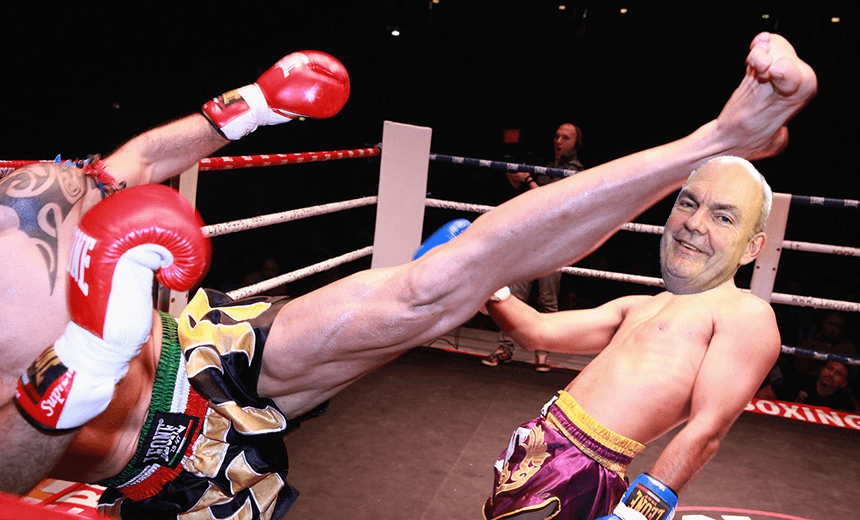Budget 2017: After a year of taking heavy shots from the opposition, National responded with a 1-2 of their own with today’s budget announcements, writes Ben Thomas.
Read all our Budget 2017 coverage here.
Steven Joyce, bomaye.
Translated from Lingala to internet English, that basically means “Steve Joyce, slay!”. The catchcry was popularised by fans of Muhammed Ali when he battled George Foreman at the 1974 Rumble in the Jungle in Zaire. It’s what Ali did then, and it’s what Prime Minister Bill English and Joyce did today. And they did it the same way.
Up against the imposing Foreman, the ageing Ali abandoned his trademark evasion. He camped on the ropes and let Foreman hit his arms and shoulders. Eventually Foreman spent all his energy and had nothing left when Ali returned fire deep into the fight. He called his strategy “rope a dope”.
Over the past year, with mounting budget surpluses projected, National has absorbed criticism from the opposition that it is underinvesting in families, neglecting infrastructure heaving under the weight of immigration, and allowing social services to be run down.
And today National punched back, promising increased spending in almost every area conceivable. Across the board tax cuts. Increased social spending. Enormous investment in roads. Even more money for Radio New Zealand!
So much so that Joyce pronounced even with the huge expected surpluses of the next few years, the cash left for a Labour government will be “almost exactly zero”.
Labour can’t complain – this is what they asked for. So now they will be forced to specify exactly what they want to cut throughout the election campaign when they promise new spending. Andrew Little looked flatfooted and defeated in his third budget speech as opposition leader.
It’s not perfect of course.
The “families package” tax adjustments of up to $20 a week give a welcome top up for low and middle income earners, which helps disguise the low per capita GDP growth of the past few years. It also has the flow on effect of increasing superannuation payments, which are based on after tax average income. This government, like its predecessors, is nothing if not un-serious about addressing the future and present cost of the Baby Boom to working New Zealanders.
It also has the unfortunate effect of feeding into a false narrative dating back to 2005 or so that we get pay rises from the government. There is always an argument for returning over-taxation, but we can’t tax-cut our way to individual wealth in $10 dribs and $20 drabs.
Nonetheless, it speaks to how comprehensively Joyce gazumped Labour that Little was reduced to talking about a “dollar Bill” budget – saying that although a single person not receiving Working For Families on $32,000 would get $11 in tax back, they would lose the $10 a week Independent Earners Allowance, giving them a measly $1 in the hand.
Well, good. The Independent Earner Allowance was a bizarre innovation of John Key and Bill English on the 2008 campaign trail – quite literally a welfare payment targeted at people whose disadvantage was they didn’t receive any welfare payments. If National is only scrapping it now, it’s still not before time. Joyce has promised further changes to streamline the distortionary effect of these kinds of benefits, including Working For Families, which disincentivise higher earning by reducing welfare payments by the same amount.
Joyce correctly said before the budget – in a classic case of underpromising and overdelivering – that the answer is not always to throw more money at issues. But where the main problem is decades of underfunding, it’s a good start. So an extra $55m per year for mental health services is a welcome beginning to addressing the public health pandemic of the 21st century.
There are notable absences. The record transport spend will do little to fix Auckland’s gridlock woes, meaning more time stalled in traffic for the largest voting base in the country to think what could have been.
But don’t think the budget is the last word on government management, as Morgan Godfery rightly pointed out today. Many of the big issues facing New Zealand are regulatory failures, not simply too little cash. The banner example is housing. Here the budget measures – while significant in dollar terms – do nothing to address real problems. There are significant increases to the accommodation supplement to help with the ballooning cost of housing. But while housing is undersupplied, this new money will simply provide a windfall to landlords rather than tenants who are struggling. Here, Joyce could have listened to some of his own advice.
This content is brought to you by LifeDirect by Trade Me, where you’ll find all the top NZ insurers so you can compare deals and buy insurance then and there. You’ll also get 20% cashback when you take a life insurance policy out, so you can spend more time enjoying life and less time worrying about the things that can get in the way.
This election year, support The Spinoff Politics by using LifeDirect for your insurance. See lifedirect.co.nz/life-insurance





